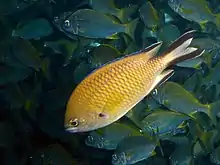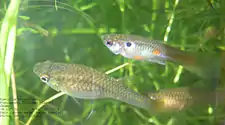| Ovalentaria Temporal range: | |
|---|---|
 | |
| Atlantic chromis (Chromis limbata), a damselfish | |
 | |
| Reef needlefish Strongylura incisa | |
| Scientific classification | |
| Domain: | Eukaryota |
| Kingdom: | Animalia |
| Phylum: | Chordata |
| Class: | Actinopterygii |
| Clade: | Percomorpha |
| (unranked): | Ovalentaria W. L. Smith and T. J. Near, 2012 |
Ovalentaria is a clade of ray-finned fishes within the Percomorpha, referred to as a subseries. It is made up of a group of fish families which are referred to in Fishes of the World's fifth edition as incertae sedis, as well as the orders Mugiliformes, Cichliformes, and Blenniiformes. It was named by W. L. Smith and T. J. Near in Wainwright et al. (2012) based on a molecular phylogeny, but the authors suggested that the group was united by the presence of demersal eggs that are attached to a substrate. Some authors have used the ordinal name Stiassnyiformes for a clade including Mugiloidei, Plesiopidae, Blenniiformes, Atherinomorpha, and Cichlidae, and this grouping does appear to be monophyletic.[2]
.jpg.webp)

Classification
In the 5th edition of Fishes of the World, the Ovalentaria are classified as:[2]
- incertae sedis
- Family Ambassidae (Asian glassfishes)
- Family Embiotocidae (surfperches)
- Family Grammatidae (basslets)
- Family Plesiopidae (roundheads)
- Family Polycentridae (South American leaffishes)
- Family Pomacentridae (damselfishes)
- Family Pseudochromidae (dottybacks)
- Family Opistognathidae (jawfishes)
- Order Mugiliformes
- Family Mugilidae (mullets)
- Order Cichliformes
- Family Cichlidae (cichilds)
- Family Pholidichthyidae (convict blenny)
- Order Blenniiformes
- Family Tripterygiidae (triplefin blennies)
- Family Dactyloscopidae (sand stargazers)
- Family Blenniidae (combtooth blennies)
- Family Clinidae (kelp blennies)
- Family Labrisomidae (labrisomid blennies)
- Family Chaenopsidae (tube blennies)
- Order Gobiesociformes
- Family Gobiesocidae (clingfishes)
- Infraseries Atherinomorpha
- Order Atheriniformes
- Suborder Atherinopsoidei
- Family Atherinopsidae (New World silversides)
- Family Notocheiridae (surf silversides)
- Suborder Atherinoidei
- Family Isonidae (surf sardines)
- Family Melanotaeniidae (rainbowfishes and blue eyes)
- Family Atherionidae (pricklenose silversides)
- Family Dentatherinidae (Mercer's tusked silverside)
- Family Phallostethidae (priapiumfishes)
- Family Atherinidae (Old World silversides)
- Suborder Atherinopsoidei
- Order Beloniformes
- Suborder Adrianichthyoidei
- Family Adrianichthyidae
- Suborder Exocoetoidei
- Superfamily Exocoetoidea
- Family Exocoetidae (flying fishes)
- Family Hemiramphidae (Halfbeaks)
- Family Zenarchopteridae (viviparous halfbeaks)
- Superfamily Scomberesocoidea
- Family Belonidae (needlefishes)
- Family Scomberesocidae (sauries)
- Superfamily Exocoetoidea
- Suborder Adrianichthyoidei
- Order Cyprinodontiformes
- Suborder Aplocheiloidei
- Family Aplocheilidae (Asian rivulines)
- Family Nothobranchiidae (African rivulines)
- Family Rivulidae (New World rivulines)
- Suborder Cyprinodontoidei
- Superfamily Funduloidea
- Family Profundulidae (Middle American killifishes)
- Family Goodeidae
- Family Fundulidae (topminnows)
- Superfamily Valencioidea
- Family Valenciidae (Valencia toothcarps)
- Superfamily Cyprinodontoidea
- Family Cyprinodontidae (pupfishes)
- Superfamily Poecilioidea
- Family Anablepidae (four-eyed fish)
- Family Poecilidae (livebearers)
- Superfamily Funduloidea
- Suborder Aplocheiloidei
- Order Atheriniformes
The sister clades to the Ovalentaria is the group of taxa called the Carangimorpharia or Carangaria, which includes the flatfishes, billfishes, and jacks among others.[2][3]
References
- ↑ Cantalice, Kleyton Magno; Alvarado-Ortega, Jesús; Bellwood, David Roy (2020-03-01). "†Chaychanus gonzalezorum gen. et sp. nov.: A damselfish fossil (Percomorphaceae; Pomacentridae), from the Early Paleocene outcrop of Chiapas, Southeastern Mexico". Journal of South American Earth Sciences. 98: 102322. doi:10.1016/j.jsames.2019.102322. ISSN 0895-9811.
- 1 2 3 J. S. Nelson; T. C. Grande; M. V. H. Wilson (2016). Fishes of the World (5th ed.). Wiley. p. 752. ISBN 978-1-118-34233-6.
- ↑ Ricardo Betancur-R; Edward O. Wiley; Gloria Arratia; et al. (2017). "Phylogenetic classification of bony fishes". BMC Evolutionary Biology. 17 (1): 1. doi:10.1186/s12862-017-0958-3. PMC 5501477. PMID 28683774.